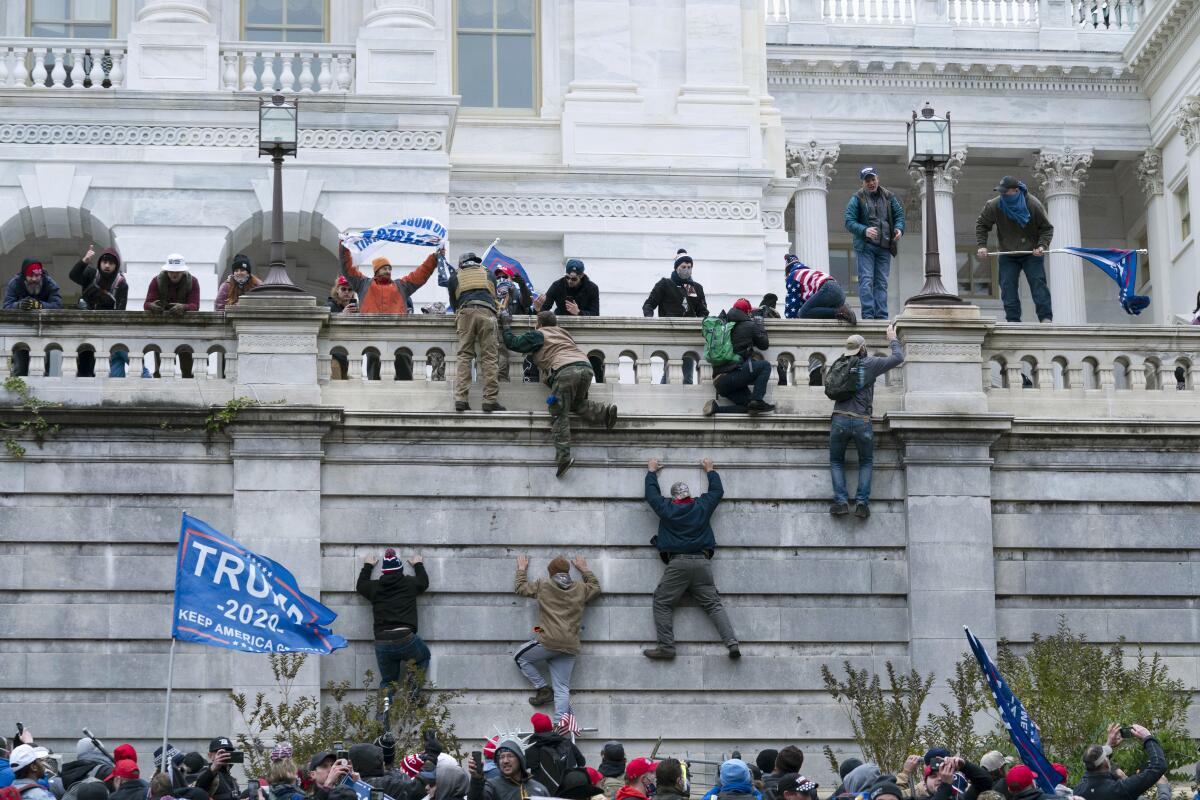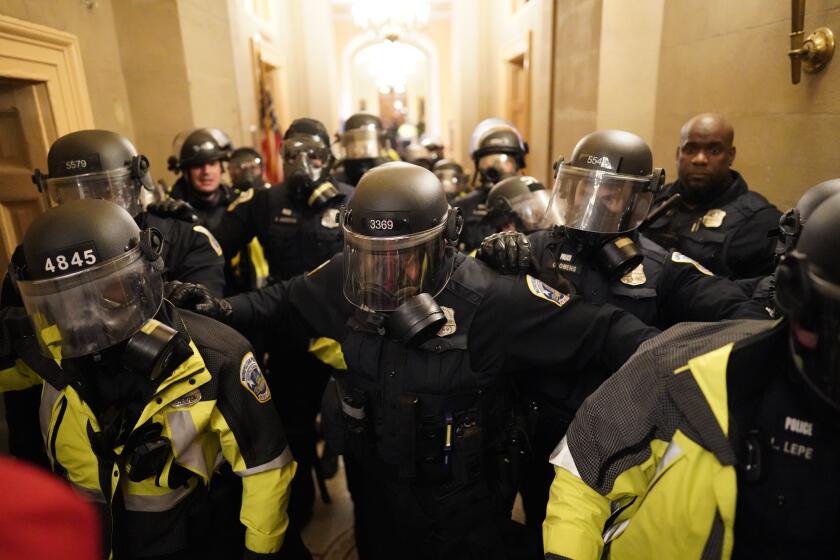Column: After the riot at the Capitol, where do we go from here? Ask the Republicans

- Share via
What happened at the U.S. Capitol on Wednesday was not a protest. It was more like the storming of the Tsar’s Winter Palace in 1917 or a scene from the Arab Spring.
Tear gas. Undetonated IEDs. Confederate flags and overturned barricades. Congressional leaders evacuated for their own safety as they attempted to certify a free and fair election. What country was this?
We have reached a turning point for the nation, and what happens next depends on the answer to this question: Were Wednesday’s disgraceful activities the final dying gasps of the 4-year-old Trump catastrophe on the road back to normality — or are we headed for a future in which the rule of law is expendable, bipartisanship is a fool’s errand and violence is a real possibility?
The answer to that question lies in the hands of the Republicans.
Trump deserves to be prosecuted for inciting a riot, and his cultists all need to face the wrath of the legal system.
Even before President Trump came to power, American politics were growing dysfunctional, characterized by repeated government shutdowns, legislative gridlock and vicious nomination battles. Arguably, both parties deserved some portion of the blame.
But after the 2016 election, all semblance of political normality was tossed aside. And almost as troubling as the deranged, narcissistic behavior of the president himself was the craven way in which more reasonable Republicans acceded to him and treated his behavior as if it were acceptable.
The Mitch McConnells and Mike Pences and Josh Hawleys and Kevin McCarthys and Ted Cruzes and many others mortgaged their integrity out of cynical self-interest. They empowered Trump in a cheap bid to ensure their own political survival. And now that he is moving on — God willing — they have to search their souls for what they want to happen next.
The Republican Party must decide whether it will stick with the mob or stand up for democracy. That test begins now, as Congress resumes its task of confirming the electoral college vote. McConnell seems to have finally reached his limit at the 11th hour. But will Ted Cruz and his colleagues really perpetuate the fiction, which I highly doubt they even believe themselves, that this election might have been stolen? It was not and they should acknowledge that.
For his part, President-elect Biden seems to believe that his decades in the Senate, his long relationships with Republicans and his willingness to work across the aisle will help heal all wounds. That was his campaign pitch: If we would just put an affable uniter in the Oval Office, our long national nightmare would be over.
I hope that’s the case, but a part of me worries that he’s underestimating the difficulties. Between the tensions of the pandemic, the vicissitudes of the economy, the continuing bitterness of the Trump base, the deepening siloes into which Americans have sorted themselves and the radicalization of the Republican Party — will it really be so easy to heal ourselves? What will it take to turn down the temperature?
It‘s sad that we’ve gotten to this place. For most of its history, the United States has respected the rule of law. Its citizens, for all their political differences, have generally supported our democratic institutions. For 245 years, Americans have mostly accepted the outcomes of elections, and power has been transferred peacefully from president to president. We’ve usually agreed to fight our policy battles through reasoned debate rather than street warfare.
That doesn’t mean, of course, that American politics have always been genial and cooperative. The Ohio National Guard shot and killed four antiwar demonstrators at Kent State in 1970 and police clubbed peaceful protesters in Chicago in 1968. We’ve undergone fiery riots born of inequality, including here in Los Angeles in 1965 and 1992. America has the stain of slavery. It permitted lynchings, interned American citizens of Japanese origin and committed genocide against the people who inhabited the land before the colonizers arrived. In the mid-19th century, a civil war nearly tore the country apart.
But over time, we’ve also learned from our mistakes, working — sometimes in a bipartisan manner — to expand rights and promote equality. Even in tough times, we’ve acknowledged that elections have consequences and must be respected, regardless of whether we supported or opposed the winner. Obviously, that’s a fundamental and essential requirement for a functioning democracy.
When Jan. 20 comes, I hope we will transfer power peacefully once again, and that Joe Biden will be sworn in as president. Then I hope we can move forward on what is sure to be a daunting task: restoring the faith in our democracy that has been so selfishly and cynically battered by Donald Trump and his enablers, and moving forward to solve the difficult public policy issues that face us.
@Nicholas_Goldberg
More to Read
A cure for the common opinion
Get thought-provoking perspectives with our weekly newsletter.
You may occasionally receive promotional content from the Los Angeles Times.












